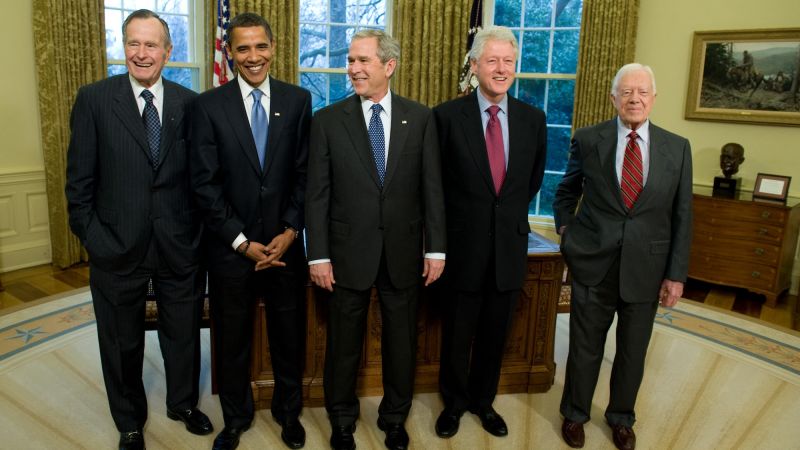CNN
—
Former President Jimmy Carter’s active post-presidency extended to relationships with his seven successors in the White House.
Some of them leaned on his experience and advice, as well as his diplomatic abilities. Carter, who died Sunday at age 100, also used his platform to speak out against some presidents — when he felt it was warranted.
Here’s a look at his relationship with some of his successors:
President Joe Biden and first lady Jill Biden visited with Carter and former first lady Rosalynn Carter at their home in Plains, Georgia, shortly after taking office in 2021.
That April 2021 visit marked their only in-person meeting until the 2023 memorial service for Rosalynn Carter; the Carters did not attend Biden’s inauguration due to the Covid-19 pandemic.
“It was great to see President Carter. He reminded me that I was the first person to endorse him outside of Georgia. And we sat and talked about the old days,” Biden told reporters after the visit.
He added, “Rosalynn was great too. We just had a nice time. … They’re old friends.”
Biden was indeed the first US senator to endorse Carter in his 1976 presidential bid, according to the Jimmy Carter Presidential Library.
“We believe being ‘right’ on the issues is not enough in 1976. Our nation and our party need a president who is not only right, but who has demonstrated ability to accomplish our common goals,” Biden and then-Sen. Birch Bayh wrote in a joint letter at the time, adding, “We believe that person is Jimmy Carter.”
Biden celebrated Carter’s 100th birthday with a video released in October 2024, calling him a “moral force for our nation and the world” and a “beloved friend.”
Carter was in touch with Donald Trump and his administration multiple times during his presidency.
In 2018, Carter said that he received a briefing on North Korea following Trump’s announcement of new sanctions on the country and that he’d be willing to travel to North Korea on the Trump administration’s behalf. In 2019, Carter wrote Trump a letter on US-China trade relations and spoke with him by phone.
While the White House referred to the 2019 call as a “very good telephone conversation” and said Trump “has always liked President Carter,” the relationship deteriorated later that year when Carter called for a full investigation into Russian interference in the 2016 election and suggested it “would show that Trump didn’t actually win the election.” Carter later issued stark warnings about Trump’s decision to withhold funding from the World Health Organization amid the Covid-19 pandemic.
Trump, for his part, called Carter a “nice man” and a “terrible president” during a G20 Summit news conference in June 2019.
In the days before Carter’s death, Trump, now president-elect, railed against a pair of treaties Carter negotiated during his term regarding the Panama Canal.
Carter candidly said in 2014 that then-President Barack Obama did not reach out to him for advice.
Asked by NBC News whether Obama seeks his counsel, Carter said, “Unfortunately, the answer is no. President Obama doesn’t. But previous presidents have called on me and the Carter Center to take action. President Clinton did, and President George W. Bush, and H.W. Bush, and even Ronald Reagan used to call on us to go into sensitive areas. When the United States didn’t have relationships with kind of unsavory characters, they would ask me as a private citizen to do so.”
Carter cited his organization’s “strong and public position of equal treatment between the Palestinians and the Israelis” as a reason for his distance from Obama: “I think this was a sensitive area in which the president didn’t want to be involved.”
Carter was critical of the George W. Bush administration, publicly lambasting the president and his handling of the Iraq War in a 2007 interview.
“I think as far as the adverse impact on the nation around the world, this administration has been the worst in history,” Carter told The Arkansas Democrat-Gazette in a phone interview.
He continued, “The overt reversal of America’s basic values as expressed by previous administrations, including (those of) George H.W. Bush and Ronald Reagan and Richard Nixon and others, has been the most disturbing to me.”
A White House spokesperson responded at the time, according to The New York Times, calling Carter “irrelevant” and “sad.”
But Carter later offered Bush praise; at the 2013 opening of the George W. Bush Presidential Center, Carter extended his “admiration” to the 43rd president, heralding Bush for keeping his word and acting to end a 20-year civil war in Sudan.
“In January of 2005, there was a peace treaty between North and South Sudan that ended a war that had been going on for 20 years,” Carter said. “George W. Bush is responsible for that.”
As president, Bill Clinton took Jimmy Carter up on an offer to help de-escalate tensions with North Korean leader Kim Il Sung, according to the Clinton Library.
“The use of President Carter to resolve this conflict proved complicated, when he announced an unofficial agreement with North Korea to bring an end to the stalemate on CNN before allowing the Clinton Administration officials to review the agreement,” the Clinton Library said in a brief history of their relationship.
Carter later joined a diplomatic team along with former Chairman of the Joint Chiefs of Staff Colin Powell and Sen. Sam Nunn of Georgia to help “avoid an armed conflict with the military leaders of Haiti,” the Clinton Library said.
Clinton presented Carter with the Presidential Medal of Freedom, the nation’s highest civilian honor, in 1999.





